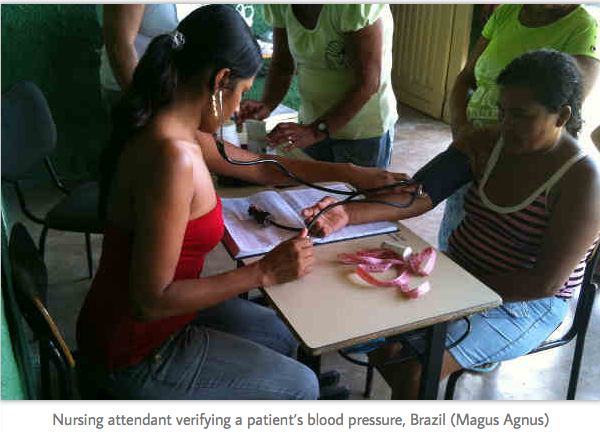
April 7th is World Health Day. This year focuses on high blood pressure, one of the many diseases increasing across both the industrialized and developing worlds. Food Tank is hosting a week of informative posts about how personal and large-scale changes in both food and agriculture systems can address these diseases.

April 7th is World Health Day. This year focuses on high blood pressure, one of the many diseases increasing across both the industrialized and developing worlds. Food Tank is hosting a week of informative posts about how personal and large-scale changes in both food and agriculture systems can address these diseases.
The World Health Organization (WHO) reports that one-third of adults worldwide have high blood pressure and one in ten adults are diabetic. These diseases are prevalent in the United States, where high blood pressure alone affects over 76 million American adults, but they are also increasingly common in other parts of the world. WHO reports that the highest levels of hypertension now affect some low-income African countries, where over 40 percent of adults have the disease.
While there are many reasons for this problem, diet is one of the most significant. The world today is facing a food paradox. There are nearly one billion people hungry and one billion people overweight, and many countries now face these problems simultaneously. Although they may seem to be opposites, reports from groups such as the Barilla Center for Food & Nutrition (BFCN) have linked both hunger and obesity with poor nutrition.
The nutrient levels in many foods are dropping. The Organic Center reports that, as crop yields have increased, the amount and variety of essential nutrients in these food crops has significantly declined. The result is that the same amount of sweet corn, potatoes, or bread now has on average far less calcium (16 percent less), iron (15 percent less) and riboflavin (38 percent less) than it did fifty years ago. At the same time, a global emphasis on calorie content has increased access to high-calorie, processed foods around the world, even as access to nutrient rich fruits and vegetables has become more limited.
The good news is that many efforts to change this system are already underway, and studies from Barilla, the U.N. Food and Agriculture Organization, AVRDC-The World Vegetable Center, The Organic Center, the World Health Organization, and others show that even small changes in a person’s diet, such as eating more fruits and vegetables per day, can dramatically improve their long-term health.
In the next week, Food Tank will countdown to World Health Day by highlighting the changes, both in agriculture and personal diets, that can help prevent diseases like high blood pressure.